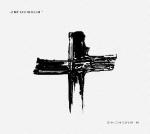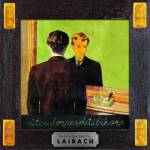 Hailing from Portland, Oregon, Amerakin Overdose it’s a more metal then industrial, heavy sextette. Strong riffs, subtle electronic layers, furious vocals filled with consistent message and all the shock rock weaponry turn this project into a deadly machinery. Reminded me of Bile (and their killer “I Reject”), but also their style and sound can be associated with the music of Rob Zombie, Slipknot, Static X, Killswitch Engage, Schnitt Acht, Filter, Cop Shoot Cop, 16 Volt, Marilyn Manson, etc, a powerful, groovy mixture of groove metal strength, modern beats and industrial rock intensity.
Hailing from Portland, Oregon, Amerakin Overdose it’s a more metal then industrial, heavy sextette. Strong riffs, subtle electronic layers, furious vocals filled with consistent message and all the shock rock weaponry turn this project into a deadly machinery. Reminded me of Bile (and their killer “I Reject”), but also their style and sound can be associated with the music of Rob Zombie, Slipknot, Static X, Killswitch Engage, Schnitt Acht, Filter, Cop Shoot Cop, 16 Volt, Marilyn Manson, etc, a powerful, groovy mixture of groove metal strength, modern beats and industrial rock intensity.
Amerakin Overdose has been forged from six very unique individuals. Cody Perez (lead singer), “The Brick” (drums) Freeman Manfree (Guitar),“The Human” (Keyboards /Sequencing ), Enygma ( hype and shenanigans) each member embodies and personifies an element of modern Amerakin culture , power, corporate greed, pride, death, war, sex, money etc…. While the whole planet has overdosed on Amerakin culture and been consumed by double speak and cross talk , western society has lost all hope and embraced the living dead mentality. Amerakin Overdose urges you to “free your mind and see what’s inside” scare yourself to death and be reborn a free soul. Read more Amerakin Overdose – Amerakin Overdose (2012)
industrial rock
Zeromancer – Bye-Bye Borderline (2013)
 “Auf Wiedersehen Boy”, the opening track of Zeromancer’s new album, sounds just like a “Mechanical Animals”/”The Golden Age of Grotesque” type of Marilyn Manson anthem. The following “Bye-Bye Borderline” sounds more like a wicked mixture of David Bowie and Muse with a twist of Linkin Park in the chorus.
“Auf Wiedersehen Boy”, the opening track of Zeromancer’s new album, sounds just like a “Mechanical Animals”/”The Golden Age of Grotesque” type of Marilyn Manson anthem. The following “Bye-Bye Borderline” sounds more like a wicked mixture of David Bowie and Muse with a twist of Linkin Park in the chorus.
Smooth electronic layers, solid rock riffs, goth and gloomy vibe, cyber pop flavored melodies and powerful vocal hooks are all vital parts of the Zeromancer’s arsenal.
From the third “Lcyd”, I can distinctly hear a powerful H.I.M. influence running through the vein of their songs merged with a subtle A-HA flavour. But Zeromancer pushed their sound in a fuhrer dark direction and added a more industrial/electronic taste to it. “Bye-Bye Borderline” it’s a strong and balanced mixture of industrial rock and goth vibe, of Northern gloom and charming melodies, of electric rock and electronic pop. Read more Zeromancer – Bye-Bye Borderline (2013)
The CNK – Revisionnisme (2012)
 The CNK started as a raw black metal group, named Count Nosferatu in 1996 by Nicolas St Morand (aka Mr Hreidmarr) and Jean-Sébastien Ogilvy (aka Heinrich Von B). They shortly changed their name into Count Nosferatu Kommando. Hreidmarr joined symphonic black metal act Anorexia Nervosa in 1998 and due to he’s busy schedule with his new band, the project was put aside in 1999.
The CNK started as a raw black metal group, named Count Nosferatu in 1996 by Nicolas St Morand (aka Mr Hreidmarr) and Jean-Sébastien Ogilvy (aka Heinrich Von B). They shortly changed their name into Count Nosferatu Kommando. Hreidmarr joined symphonic black metal act Anorexia Nervosa in 1998 and due to he’s busy schedule with his new band, the project was put aside in 1999.
The band’s real rebirth came in 2002, with the release of properly entitled “Ultraviolence Über Alles” album, on the late Kodiak Records label. Merging Rammstein and Slayer, Skinny Puppy and Deicide, The CNK delivered a furious and merciless mixture of death and industrial metal with Laibach flavored gravity.
Due to a lack of steady line-up, CNK wasn’t able to support their album on stage. Then, because of several problems such as the label’s demise, the band was once again put aside in 2003. Read more The CNK – Revisionnisme (2012)
Laibach – An Introduction To… Reproduction Prohibited (2012)
 Although my affection for Industrial music started in the beginning of the 90s with several American bands such as Nine Inch Nails, Ministry and Malhavoc, I can trace the roots of my affection and affiliation back to bands such as Einstürzende Neubauten and Laibach. Even further, in my humble opinion the whole Neue Deutsche Härte (“New German Hardness”) movement it’s build upon not a German, but on the edge cutter and envelop pusher work of a Slovenian avant-garde music group formed on June 1, 1980 in Trbovlje, Slovenia, at the time SFR Yugoslavia: Laibach (the German name for Slovenia’s capital city, Ljubljana).
Although my affection for Industrial music started in the beginning of the 90s with several American bands such as Nine Inch Nails, Ministry and Malhavoc, I can trace the roots of my affection and affiliation back to bands such as Einstürzende Neubauten and Laibach. Even further, in my humble opinion the whole Neue Deutsche Härte (“New German Hardness”) movement it’s build upon not a German, but on the edge cutter and envelop pusher work of a Slovenian avant-garde music group formed on June 1, 1980 in Trbovlje, Slovenia, at the time SFR Yugoslavia: Laibach (the German name for Slovenia’s capital city, Ljubljana).
After the breath taker “Monumental Retro-Avant-Garde, Live at Tate Modern”, Laibach now are back with another history lesson, a retrospective of the band’s history, the compilation released by Mute on September 3rd. Back then (July 21st) I wrote a quite exhaustive history of the band.
The rumors were that the band re-recorded these songs for the compilation, now that thing was not mentioned and the songs sound exactly as the original releases, so at most, they were re-mastered. Still, Laibach sounds massive and irresistible. Read more Laibach – An Introduction To… Reproduction Prohibited (2012)
Slunq – Spoiled Portion (2012)
 The music of Slunq is so genreless and quite post-everything that it is impossible to stick a label on it; to force it into one of the “casual” drawers of the “music industry/business”. But, against the general trends, this is music and not just “food for our iPods”, not just background noise to fill up our ears – and brains – and cut off any possible contact with the people we may crash into on our way back and forth between home and job.
The music of Slunq is so genreless and quite post-everything that it is impossible to stick a label on it; to force it into one of the “casual” drawers of the “music industry/business”. But, against the general trends, this is music and not just “food for our iPods”, not just background noise to fill up our ears – and brains – and cut off any possible contact with the people we may crash into on our way back and forth between home and job.
The much anticipated debut album, “Spoiled Portion”, is a post-modern journey into some gloomy music with very different flavours including Post-Grunge and Post-Industrial. Think of Jerry Cantrell (Alice In Chains) on a heavy Trent Reznor (Nine Inch Nails, How to Destroy Angels) diet, but adding an obvious, typical English flavour to it and although lots of influences are there, you can’t really pinpoint anything – the guys managed to twist everything into their own style and deliver genuine material for our listening pleasure.
The result of 2 years effort, the 11 tracks of “Spoiled Portion” paint not the present, but the future sound of Rock. Read more Slunq – Spoiled Portion (2012)
Ostfront – Ave Maria (2012)
 Operation Ostfront (German for “Eastern Front”) was the sortie into the Arctic Ocean by the German warship Scharnhorst during World War II. In May 1941, after the loss of the German battleship Bismarck, Adolf Hitler had forbidden any German capital ship from venturing into contested seas. By December 1943 the tide had turned against Germany. The Battle of the Atlantic had been lost, and supplies poured into the United Kingdom and the Soviet Union. In September 1943 the German battleship Tirpitz was disabled during the British Operation Source, leaving Scharnhorst and Prinz Eugen the only operational heavy ships in the Kriegsmarine. In November 1943 the Arctic Convoys restarted. On 19 December 1943 Grand Admiral Karl Dönitz submitted a request to Hitler to allow Scharnhorst to attack the next convoy sailing through the Barents Sea. On the 25 December 1943 Dönitz ordered Ostfront to commence. Admiral Fraser, alerted by Norwegian resistance information to the possibility of an interception by Scharnhorst, prepared a trap for the German warship.
Operation Ostfront (German for “Eastern Front”) was the sortie into the Arctic Ocean by the German warship Scharnhorst during World War II. In May 1941, after the loss of the German battleship Bismarck, Adolf Hitler had forbidden any German capital ship from venturing into contested seas. By December 1943 the tide had turned against Germany. The Battle of the Atlantic had been lost, and supplies poured into the United Kingdom and the Soviet Union. In September 1943 the German battleship Tirpitz was disabled during the British Operation Source, leaving Scharnhorst and Prinz Eugen the only operational heavy ships in the Kriegsmarine. In November 1943 the Arctic Convoys restarted. On 19 December 1943 Grand Admiral Karl Dönitz submitted a request to Hitler to allow Scharnhorst to attack the next convoy sailing through the Barents Sea. On the 25 December 1943 Dönitz ordered Ostfront to commence. Admiral Fraser, alerted by Norwegian resistance information to the possibility of an interception by Scharnhorst, prepared a trap for the German warship.
On 25 December Scharnhorst sailed to intercept the British convoy, JW 55B, believing it to be sparsely protected. In the ensuing Battle of the North Cape Scharnhorst was separated from her escorting destroyers and was sunk. This is history.
Neue Deutsche Härte – “New German Hardness” it’s a term invented by the German music press in 1995 specially to describe/defined the music delivered by Rammstein on their debut album “Herzeleid”. Also known as German Electronic Metal or Dance Metal (tanzmetall), this new genre has its roots in the music of bands such as Laibach, Die Krupps and Oomph! and along Rammstein the genre is proudly represented by bands such as Eisbrecher, Megaherz, Megaherz, Tanzwut, Umbra et Imago, In Extremo, Omega Lithium, Stahlhammer, Fleischmann, etc.
Ost+Front will definitively delight all and each Rammstein fan. Read more Ostfront – Ave Maria (2012)
Black Light Burns – The Moment You Realize You’re Going To Fall (2012)
 “The Moment You Realize You’re Going To Fall”, the sophmore album by the Wes Borland leaded and fronted Black Light Burns sounds sweat and dark in a quite David Bowish manner. It’s impossible to stick any label to this music, it’s impossible to squeeze it into any defined genre of style, this is post “something” without being typically finicky and selfishly obscure and pointlessly exclusivist, it’s simultaneously Rock, mainly noisy and garage taste-like, but sometimes Jazzy, and Industrial in a quite classic sense and approach, but avoiding all the cliches and mandatory conformity. It’s arty, but not abstract and it’s trippy without becoming shapeless. Wes Borland definitively founded a fascinating, very own flavored path here and delivered a pretty exciting material.
“The Moment You Realize You’re Going To Fall”, the sophmore album by the Wes Borland leaded and fronted Black Light Burns sounds sweat and dark in a quite David Bowish manner. It’s impossible to stick any label to this music, it’s impossible to squeeze it into any defined genre of style, this is post “something” without being typically finicky and selfishly obscure and pointlessly exclusivist, it’s simultaneously Rock, mainly noisy and garage taste-like, but sometimes Jazzy, and Industrial in a quite classic sense and approach, but avoiding all the cliches and mandatory conformity. It’s arty, but not abstract and it’s trippy without becoming shapeless. Wes Borland definitively founded a fascinating, very own flavored path here and delivered a pretty exciting material.
Vividly colored, changing moods and grooves, “The Moment You Realize You’re Going To Fall” it’s a bold, literally edgy cutting, modern (Industrial) Rock album, one of the finest of it’s kind.
Quitting Limp Bizkit in 2001, Read more Black Light Burns – The Moment You Realize You’re Going To Fall (2012)
Celldweller – Wish Upon a Blackstar (2012)
 Klayton, the sole brain behind Celldweller, not only ignores genre boundaries and creates a pioneering vision of the future of electronic music, but he’s also an excellent and subtle songwriter. So, “Wish Upon A Blackstar”, he’s upcoming second full-length studio album, obviously it’s one of the most anticipated Electronic albums of the year. And Celldweller is one of the most reliable artists as well, the new 16 tracks album will satisfy all of his devoted followers – over 120,000 Facebook Fans and still counting – and eventually will bring him a brand new generation of fans. After all, Celldweller is considered “personifying the sound of the iPod generation”, and his hybrid music of digital and organic elements and the smooth, but highly explosive fusion of styles and genres, makes him extremely unique and charming. Read more Celldweller – Wish Upon a Blackstar (2012)
Klayton, the sole brain behind Celldweller, not only ignores genre boundaries and creates a pioneering vision of the future of electronic music, but he’s also an excellent and subtle songwriter. So, “Wish Upon A Blackstar”, he’s upcoming second full-length studio album, obviously it’s one of the most anticipated Electronic albums of the year. And Celldweller is one of the most reliable artists as well, the new 16 tracks album will satisfy all of his devoted followers – over 120,000 Facebook Fans and still counting – and eventually will bring him a brand new generation of fans. After all, Celldweller is considered “personifying the sound of the iPod generation”, and his hybrid music of digital and organic elements and the smooth, but highly explosive fusion of styles and genres, makes him extremely unique and charming. Read more Celldweller – Wish Upon a Blackstar (2012)
Marilyn Manson – Born Villain (2012)
 This is one of the albums of 2012 I really waited for, but on the other hand I was kind of afraid of. When Twiggy Ramirez was often quoted as saying “It’s our best record yet, I think. I mean, everyone always says that, but I think this is our best work so far… It’s kind of like a little more of a punk rock “Mechanical Animals” without sounding too pretentious.”, and since the previous “The High End of Low” it’s an almost four years gap, the expectations are pretty high. “No Reflection” kind of scared me further because it doesn’t actually sound pretty convincing, although it’s a quite fair Rock track.
This is one of the albums of 2012 I really waited for, but on the other hand I was kind of afraid of. When Twiggy Ramirez was often quoted as saying “It’s our best record yet, I think. I mean, everyone always says that, but I think this is our best work so far… It’s kind of like a little more of a punk rock “Mechanical Animals” without sounding too pretentious.”, and since the previous “The High End of Low” it’s an almost four years gap, the expectations are pretty high. “No Reflection” kind of scared me further because it doesn’t actually sound pretty convincing, although it’s a quite fair Rock track.
So, “Hey, Cruel World…” just set things right, it’s a huge Manson sound like (almost) anthem and even the following “No Reflection” make more sense now, still don’t know why it was picked to be the leading single of the album while it’s almost one of the weakest track of it. Or maybe this is the reason. Or simply there is no reason. And well, no weak tracks, boring moments on this album. Read more Marilyn Manson – Born Villain (2012)
Killing Joke – MMXII (2012)
 If Ian Curtis wouldn’t committed suicide on 18 May 1980 and Joy Division would be still around and playing, “In Cythera”, the leading single of the fifteenth studio album by Killing Joke uploaded to the YouTube on 6 March it’s exactly the kind of music we are probably expected of Curtis. Although, this is a classic Killing Joke album with classic sound, and with the classic line-up: Jaz Coleman on vocals, Kevin “Geordie” Walker on guitar, Martin “Youth” Glover on bass, and Paul Ferguson on drums.
If Ian Curtis wouldn’t committed suicide on 18 May 1980 and Joy Division would be still around and playing, “In Cythera”, the leading single of the fifteenth studio album by Killing Joke uploaded to the YouTube on 6 March it’s exactly the kind of music we are probably expected of Curtis. Although, this is a classic Killing Joke album with classic sound, and with the classic line-up: Jaz Coleman on vocals, Kevin “Geordie” Walker on guitar, Martin “Youth” Glover on bass, and Paul Ferguson on drums.
Out on April 2nd via Spinefarm/Universal, “MMXII” consist of 10 tracks which will definitively rock your world. Read more Killing Joke – MMXII (2012)







